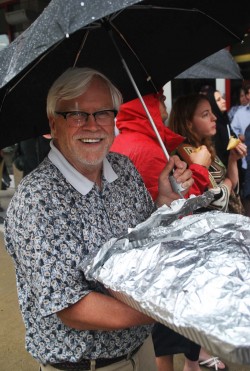Culture | October 18th, 2017

In the area this last week there were two major events dedicated to addressing and eliminating hate within the Fargo/Moorhead community. Both cities also passed an inclusive resolution to send a strong message that hate is not welcomed in our community.
Independent of their results, just knowing that events like these occur makes me, as a trans woman, feel safer to live here.
I had the privilege of talking to Barry Nelson of the North Dakota Human Rights Coalition (NDHRC) who helped moderate the Community Response to Hate event.
High Plains Reader: Could you tell me a little bit about the North Dakota Human Rights Coalition and what they do?
Barry Nelson: North Dakota Human Rights Coalition is a membership-based, statewide non-profit, founded in 2001. NDHRC works toward the enhancement of human rights in North Dakota through grassroots action, public education and legislative advocacy.
HPR: What inspired the Community Response to Hate? What organizations were involved in hosting it?
BN: Early in its existence, NDHRC sought to advocate for laws governing hate crimes/hate speech at the state level, with minimal success. The fact that North Dakota was rated second in the nation in per capita hate crimes inspired three organizations to come together to apply for a grant to look more strategically at the issue. High Plains Fair Housing (HPFH), Afro-American Development Association (AADA), and NDHRC each came to the project as partners with unique perspectives.
HPFH was seeing a rising number of situations in housing where refugees and immigrants were experiencing hate, AADA was regularly hearing from members of the Somali community of threats and harassment, and NDHRC was concerned about the higher-profile targeting of refugees/immigrants by elected officials.
HPR: How do did the conversation go? What are some of the best things that came out of this?
BN: The October 12th community conversation came about when it became clear that hate crimes and hate speech were a pervasive and often invisible problem in the state. With six highly visible hate crimes in the Fargo area, it was decided that there needed to be a conversation beginning with an accounting by the community of what we were and were not doing in response to hate crimes.
This event was an incredibly valuable, necessary and rich experience. There was a powerful exchange of ideas between those in charge of our institutions and those who are experiencing, or are at risk of experiencing, hate crimes. It was an important first step in working toward a strategy that will seek to eliminate hate in our community.
HPR: What are the next steps for this project?
BN: Three areas have emerged over the last several months in terms of an approach to creating a hate-free community: we need to focus on the immediate needs of victims when they are attacked, we need to create a program of education and awareness that must immediately deal with the impact of hate crimes, and finally, we need to look at ways that our public policy can work toward reducing and responding to hate crime.
Each of the work groups have organized with anywhere from six to twenty community members who are committed to working on a plan to make sure that 1) victims of a hate crime have an immediate offer of support and connections to resources, 2) there will be a comprehensive education and awareness program going forward, and 3) there will be a strategic plan to affect policy that will address a community response to hate.
HPR: How can people get involved?
BN: There are so many ways that people can be connected to this project. As I sat and participated in the conversation Thursday night, it became clear that this was not just an action, or an event, or a program. This has the potential to become a movement, a movement to define our community as one in which hate has no place.
North Dakota United Against Hate and AADA both have facebook pages people can contact to get involved, while NDHRC can be reached at ndhrc.org, and HPFH at highplainsfhc.org. Interested volunteers can call or text me directly, 701-388-6156 or email me bnelson371@cableone.net.
HPR: Is there anything else you'd like to add?
BN: We continue to be a community that is predominantly white, predominantly straight. A disadvantage of this is that we do not intuitively have a sense of what it might be like to be a person of color, a person originally from a nation other than the U.S., or a person with a diverse sexual orientation.
We need to find ways to educate ourselves about the world experienced by people who do not fit our very prescribed definition. This is a challenge that should not be taken lightly. It really is at the core of defining who we are as a community.
[Faye Seidler is North Dakota Safe Zone Project Spokeswoman]
February 16th 2026
February 13th 2026
January 15th 2026
January 15th 2026
December 18th 2025
__293px-wide.jpg)
_(1)_(1)_(1)_(1)_(1)__293px-wide.jpg)



_(1)__293px-wide.jpg)